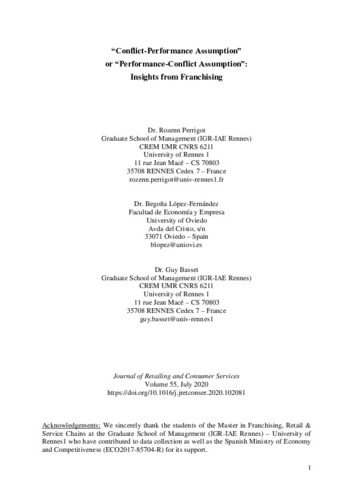“Conflict-performance assumption” or “performance-conflict assumption”: insights from franchising
Autor(es) y otros:
Palabra(s) clave:
franchising
conflicts
relational contracting
qualitative approach
Fecha de publicación:
Editorial:
Elsevier
Versión del editor:
Citación:
Resumen:
Franchising is an organizational governance form where relational and formal contracts complement each other and where franchisor and franchisees together may obtain better performance than working alone. Although relational contracts may adapt to changing environments, they are not as efficient in ambiguous settings. In franchised stores, liability for low performance is not always clear. Indeed, franchisor and franchisees work in close collaboration, and, therefore, this ambiguity on causes of low performance may lead to conflicts. The franchising literature, as far as we know, has addressed practitioners’ concerns regarding performance on one side, and conflicts on the other side, but no study has exclusively focused on low performance and the emergence of conflicts. Our research contributes to the franchising literature by filling this relative gap and, contrary to “conflictperformance assumption” (Pearson, 1973; Duarte and Davies, 2003) held in the broader context of distribution channels, we consider low performance to be a cause, rather than a consequence, of franchisor/franchisee conflicts. This empirical study deals with franchising in France, the leading market in franchising in Europe and the third largest in the world. We used a qualitative approach based on 44 in-depth interviews with 27 franchisors and executives/high-level managers of franchise chains, as well as 17 franchisees from various industries to get a dual, and so more complete, assessment of franchising practitioners’ views of performance-related conflicts. Our research findings show that franchisees, as independent small business owners, give priority to financial results compared to other goals and they are driven to continuously improve the performance of their store(s). When expectations are not met, franchisees sometimes blame franchisors because they are interdependent in their success and liability is not straightforward. As a collaborative team, franchisors and franchisees may benefit from minimizing conflicts and preventing them with the careful selection and management of franchisees that share franchisor’s values and have internal locus of control.
Franchising is an organizational governance form where relational and formal contracts complement each other and where franchisor and franchisees together may obtain better performance than working alone. Although relational contracts may adapt to changing environments, they are not as efficient in ambiguous settings. In franchised stores, liability for low performance is not always clear. Indeed, franchisor and franchisees work in close collaboration, and, therefore, this ambiguity on causes of low performance may lead to conflicts. The franchising literature, as far as we know, has addressed practitioners’ concerns regarding performance on one side, and conflicts on the other side, but no study has exclusively focused on low performance and the emergence of conflicts. Our research contributes to the franchising literature by filling this relative gap and, contrary to “conflictperformance assumption” (Pearson, 1973; Duarte and Davies, 2003) held in the broader context of distribution channels, we consider low performance to be a cause, rather than a consequence, of franchisor/franchisee conflicts. This empirical study deals with franchising in France, the leading market in franchising in Europe and the third largest in the world. We used a qualitative approach based on 44 in-depth interviews with 27 franchisors and executives/high-level managers of franchise chains, as well as 17 franchisees from various industries to get a dual, and so more complete, assessment of franchising practitioners’ views of performance-related conflicts. Our research findings show that franchisees, as independent small business owners, give priority to financial results compared to other goals and they are driven to continuously improve the performance of their store(s). When expectations are not met, franchisees sometimes blame franchisors because they are interdependent in their success and liability is not straightforward. As a collaborative team, franchisors and franchisees may benefit from minimizing conflicts and preventing them with the careful selection and management of franchisees that share franchisor’s values and have internal locus of control.
ISSN:
Patrocinado por:
We sincerely thank the students of the Master in Franchising, Retail & Service Chains at the Graduate School of Management (IGR-IAE Rennes) – University of Rennes1 who have contributed to data collection as well as the Spanish Ministry of Economy and Competitiveness (ECO2017-85704-R) for its support.
Colecciones
- Administración de Empresas [514]
- Artículos [37549]
- Investigaciones y Documentos OpenAIRE [8420]
Ficheros en el ítem





